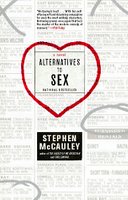 Alternatives to Sex: A Novel
Alternatives to Sex: A Novel
by Stephen McCauley
Simon & Schuster. 304 pages, $24.
SINCE HIS 1987 DEBUT, The Object of My Affection, Stephen McCauley has staked his claim to the modern gay comedy of manners. In a series of novels—The Easy Way Out, The Man of the House, True Enough—he has turned a gently satirical eye to the vagaries of love, both gay and straight, demonstrating that neither sexual orientation has a monopoly on dysfunctional relationships. His first-person narrators, focused on evaluating the quirks of the characters around them, are often clueless about the most important aspects of their own lives, while their sarcastic humor is often a defense against the vulnerability of an open heart.
In his latest work, Alternatives to Sex, that defensiveness has come to embrace an entire citizenry—and with good reason.
Set just a year after 9/11, the novel makes much of the communal post-traumatic stress disorder infecting the country, as its sundry characters take on various obsessions in an effort to make sense of their lives, or at least to distract themselves from the fear and uncertainty that grip them. “A year ago,” says William, the narrator, “everyone had been reminded of something important, but it was my impression that most of us had already forgotten what it was.” One reads McCauley as much for the clever turn of phrase and sardonic dialogue as for the comedic action: his ability to maintain that satiric voice while grappling with 9/11 is one of the more impressive aspects of the novel.
William’s particular ways of controlling his emotions revolve primarily around compulsive house cleaning, the pursuit of on-line hookups, and an obsession with a straight couple who come to his real estate office in search of a new apartment. This search, halfhearted and full of conflicting desires, becomes for William a metaphor for love. While ostensibly focused on their apartment hunting, he begins to live vicariously through this pair and finds himself crossing a professional line. Throughout, McCauley has a lot of fun with the real estate trope, as the search for the perfect home parallels the search for an ideal lover, and the fear of commitment applies equally to marriages and mortgages. In a particularly funny scene, a house inspector’s discovery of a cavalcade of structural flaws in an apartment is juxtaposed with similar revelations in a relationship.
As long as William remains obsessed with Charlotte and Samuel’s love life, he’s spared the trouble of thinking about his own. In the opening paragraph, he swears off sex; but in reality he can’t control his addiction to casual hook-ups. Ironically, the novel is really about alternatives to love. In this pursuit, William is heir to McCauley’s previous heroes, whose main subconscious aim is avoidance of their own romantic needs—a goal often achieved by focusing their attention on the relative safety of the heterosexual world, where there are fewer viable temptations. If the straight characters were portrayed as mature and level-headed, such a construct would come dangerously close to homophobia, but in McCauley’s world everyone is equally clueless about love. The satire thus plays off sexual stereotypes: the gay characters aren’t the only ones stuck in perpetual adolescence.
In the end, Alternatives to Sex is a variation on McCauley’s tried and true themes, this time through the prism of a post-9/11 world, where the traditional desire for love and stability should, one would think, be more urgent. But McCauley has never been one to give in to sentimentality; he knows human nature too well to believe that the fear of imminent annihilation will have any impact on our dedication to superficial behavior and willful self-ignorance. When William has his inevitable epiphany near the end, McCauley wisely underplays the melodrama. The important point is identification of the object of his affection; attainment can wait.
____________________________________________________________________
Lewis DeSimone, based in San Francisco, is the author of the novel Chemistry.





